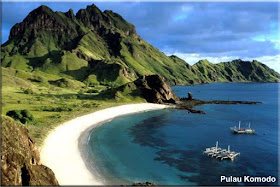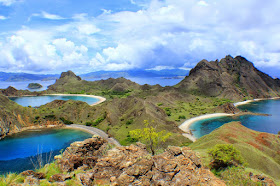 | |
| Komodo Island - Indonesia (Image by Google) |
Komodo National Park consists of three large islands of
Komodo, Rinca and Padar, and 26 large islands / other small. A total of 11
pieces of the mountain / hill in the Park with the highest peak is Mount
Satalibo (735 meters above sea level). Komodo National Park is a national asset
that has the support of technical assistance for management internationally,
and has been designated as World Natural Heritage Site and Biosphere Reserve by
UNESCO.
Natural conditions were dry and arid makes a uniqueness. The
existence of vast savanna, water resources are limited and the temperature is
hot enough; turned out to be a kind habitat favored by the ancient animal dragon
(Komodo).
Most of the Komodo National Park is a savanna with palm
trees (Borassus flabellifer) the most dominant and distinctive. Some plants in
the Park include rattan (Calamus sp.), Bamboo (Bambusa sp.), Tamarind
(Tamarindus indica), billowing (Sterculia foetida), bidara (Ziziphus jujuba),
and mangrove (Rhizophora sp.).
When traveling in
this area, visitors will be accompanied by rangers who also acts as the
handler. His job is to guide tourist trips to see the sights and animals
dragons (Komodo). In the tourist area of Komodo Island, you will find a large
creature similar to a giant lizard with 2-3m in length and weight reach 165 kg
or 100 kg empty stomach. This animal is a predator that patient. In the wild,
komodo prey are weak or have been injured, quite simply one bite to paralyze
their prey. Do not forget to bring a camera, you might want to perpetuate a
special event with a set of unique creature habitat it.
However, in order to achieve this unique animal habibat
place on Komodo Island, you have to climb Mount Ara first round 3-4 hours.
There is already a climbing lane to up there.
When you arrive at the island of Rinca, so to be up in habitats
of komodos, you must pursue a journey along 1. 5 hours. Unique charm that only
exist in the Komodo National Park that felt the animals were living in their
natural habitat there.
In addition to unique
wildlife Komodo, there are deer (Cervus timorensis floresiensis), wild boar
(Sus scrofa), ajag (Cuon alpinus javanicus), wild horse (Equus qaballus), wild
buffalo (Bubalus bubalis); 2 types of turtles, 10 species of dolphins, 6
species of whales and manatees are often seen in the waters of Komodo National
Park.
Loh Liang on Komodo Island
This is the entrance as well as most major tourist areas on
the island of Komodo. When you are happy around Komodo Island to Rinca Island,
you may be interested in diving and snorkeling in the Red Beach (Pink beach). The
beach is shallow, has a wonderful charm to captivate coral reefs.
On this beach, which is often done namely busyness snorkel,
diving, to sunbathing. Loh Liang exist in this cottage, info center, cafeteria,
pier, shelter, as well as others that you will need during the tour enjoy on
Komodo Island.
Loh Buaya Rinca Island
As well as the side that makes the Komodo National Park, you
can also find komodos in their natural
habitat. Beyond that, you can see the wildlife on the island tour on this one.
From the start of Timor deer, wild buffalo, long-tailed monkeys, wild horses,
to a variety of types of birds. The flurry of activity around which the most
interesting done on Rinca. Immortalize unique moments on the island is very
exciting activity along around.
Not far away is not the same as Loh Liang, in this place
there can be some cottage, a cafeteria, as well as the shelter is ready to
serve you. Of Rinca Island, just a short distance you can go up to Kalong
Island to see the bats in large numbers, especially the afternoon because these
animals begin foraging.
Padar Island
Padar exists between Komodo and Rinca. This is a diving and
snorkel in the Park with the stunning beauty of the beach. For you some diving and snorkel enthusiasts, there are 42
diving spots that you can specify in this Komodo tourist sites. Most one of
which is for example, Stone Samsia, which is described as well as a series of
water channels where a person could get along with all kinds of marine life
such as mackerel, turtles, sharks, etc.
There is also the Stone Stores, a palace like a rock at a
depth of 7 mtr. with exciting diving sensation. Or, Crystal Rock, a diving spot
where you can find big fish, for example Barramundi cod, parrotfish, frog fish,
etc. The potential of marine life in this national park, there
were 259 species of coral and 1,000 species of fish such as barracuda, marlin,
yellowtail, red snapper, baronang, and others.
As far as the eye can see visible open field with some palm
trees reaching to the sky background tall mountain ranges, arid and barren
impression on savanna but boisterous by some sounds of birds and wild horses,
giant reptiles. Swimming and bathing in the hot sun and blue water Flores; is a
world unto itself, and the experience is not forgotten by the tourists.
If you are satisfied visiting the island, visitors can dive
and snorkel on the beach which has the charm of a beautiful red with coral
reefs. This beach is also available at the cottage, cafetarian, pier, shelter,
information centers and other places that are needed along the way.
For visitors who like diving and snorkel, there are 42 dive
spots to choose some of them are stone samsia described as a series of water
channels where a person buffer to get along with all kinds of marine life such
as turtles, mackerel and others. In addition, there are also stone shops which
is a palace like a rock at a depth of 7 meters. Give this place a fun dive.
Visit Komodo National Parks can provide a special experience
for tourists because besides can see the dragons (Komodo) also can witness the
incredible natural scenery. Most tourists visit Komodo National Park are
foreign tourists, where they call this national park by the nickname
"world unto itself".
Accsess to Komodo National Park
From Denpasar, Mataram-Bima-Sape (via land and ferry) for
two days. Sape to the location of the park using the ferry. Denpasar-Labuan
Bajo by plane twice a week, and use a ferry or speedboat from Labuan Bajo to
the Komodo National Park.



No comments:
Post a Comment